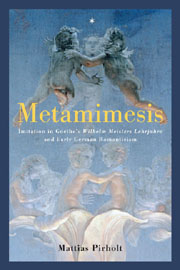Book contents
- Frontmatter
- Contents
- Acknowledgments
- List of Abbreviations
- Introduction
- 1 Romanticism, Mimesis, and the Novel
- 2 Double-Entry Imagery: Johann Wolfgang Goethe's Wilhelm Meisters Lehrjahre
- 3 Imitation and Indolence: Friedrich Schlegel's Lucinde
- 4 Imitation and Simulation: Novalis's Heinrich von Ofterdingen
- 5 Beyond Romantic Representation: Clemens Brentano's Godwi
- Conclusions: Mimesis and the Critical Politics of Romanticism
- Bibliography
- Index
3 - Imitation and Indolence: Friedrich Schlegel's Lucinde
Published online by Cambridge University Press: 05 February 2013
- Frontmatter
- Contents
- Acknowledgments
- List of Abbreviations
- Introduction
- 1 Romanticism, Mimesis, and the Novel
- 2 Double-Entry Imagery: Johann Wolfgang Goethe's Wilhelm Meisters Lehrjahre
- 3 Imitation and Indolence: Friedrich Schlegel's Lucinde
- 4 Imitation and Simulation: Novalis's Heinrich von Ofterdingen
- 5 Beyond Romantic Representation: Clemens Brentano's Godwi
- Conclusions: Mimesis and the Critical Politics of Romanticism
- Bibliography
- Index
Summary
Jeder progressive Mensch trägt einen nothwendigen Roman a priori in seinem Innern, welcher nichts als der vollständigste Ausdruck seines ganzen WESENS ist. (KA XVI, 133)
Friedrich Schlegel's first and only attempt in the novelistic genre, the roman a clef Lucinde, has been called many things: the apogee of formlessness and unnaturalness (Schiller), an irreligious work (Kierkegaard), aesthetically and morally depraved (Haym), and a formal monstrosity (Dilthey). Despite being probably the most read of all the romantic novels, it remains a provocative work of art, whose “ability to disturb (or delight) its readers seems out of proportion to its actual offence against public moeurs,” as Marc Redfield has noticed in an essay on “Lucinde's Obscenity” (2000). And it is a scandalous piece of work, no doubt, not only due to its blatant references to sexuality, promiscuity, and prostitution. The lack of a distinguishable center or a dominating perspective, the nonlinearity of narration, and the amalgamation of genres and styles make it a very modern novel indeed. No wonder, then, that Kierkegaard described it not only as irreligious but also as unpoetic!
The effect of the novel on the public was, of course, not accidental. On the contrary, obscenity constitutes a central aspect of Schlegel's conception of the novel as a genre. In a fragment written in 1798 he argues that every complete novel must “obscön sein” and that it must “d[as] Absolute <in> d[er] Wollust und Sinnlichkeit geben. — Im Meister ist weder Wollust noch χρ[Christenthum] genug für einen Rom[an]”
- Type
- Chapter
- Information
- MetamimesisImitation in Goethe's 'Wilhelm Meisters Lehrjahre' and Early German Romanticism, pp. 80 - 113Publisher: Boydell & BrewerPrint publication year: 2012



